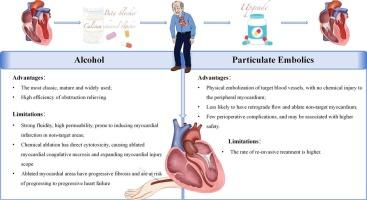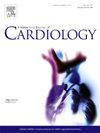Comparative efficacy of particulate embolic agents versus alcohol in percutaneous transluminal septal myocardial ablation
IF 3.2
2区 医学
Q2 CARDIAC & CARDIOVASCULAR SYSTEMS
引用次数: 0
Abstract
Background
Percutaneous transluminal septal myocardial ablation (PTSMA) is a widely used therapy for drug-refractory obstructive hypertrophic cardiomyopathy (oHCM), but alcohol ablation's non-target retrograde flow (due to high fluidity/permeability) raises complication risks, driving research into particulate embolic alternatives
Methods
This study retrospectively analyzed 132 patients with oHCM admitted to the first affiliated Hospital of Chongqing Medical University between January 2018 and July 2024. Of these, 45 patients who underwent PTSMA at our hospital were further divided into the particulate group (n = 13) and the alcohol group (n = 32) based on the type of interventional material. The analysis focused on comparing short-term clinical outcomes and post-discharge transthoracic echocardiography (TTE) results among oHCM patients undergoing PTSMA with different ablation agents
Results
The particulate group demonstrated a significantly lower incidence of intraoperative complications compared with the alcohol group (p < 0.05).The particulate group also demonstrated lower postoperative absolute cardiac troponin I(cTnI) levels (p < 0.001). The post-discharge TTE revealed a significantly higher proportion of patients with left ventricular outflow tract gradient (LVOTG) <50 mmHg in the alcohol group compared to the control group(p < 0.05)
Conclusion
Particulate embolic agents can reduce the incidence of periprocedural complications in PTSMA and may hold potential clinical utility in high-risk patients. However, the higher reintervention risk of particulate embolic agents indicates that alcohol remains the preferred embolic agent for PTSMA. Future large-scale prospective studies are needed to validate the long-term safety and efficacy of particulate embolic agents

颗粒栓塞剂与酒精在经皮腔内室间隔心肌消融中的疗效比较。
背景:经皮腔内室间隔心肌消融(PTSMA)是一种广泛应用于药物难治性阻塞性肥厚性心肌病(oHCM)的治疗方法,但酒精消融的非靶逆行血流(由于高流动性/渗透性)增加了并发症的风险,推动了颗粒栓塞替代疗法的研究。本研究回顾性分析了2018年1月至2024年7月重庆医科大学第一附属医院收治的132例oHCM患者。其中,45例在我院行PTSMA的患者根据介入材料的类型进一步分为颗粒组(n = 13)和酒精组(n = 32)。分析的重点是比较不同消融剂治疗PTSMA的oHCM患者的短期临床结果和出院后经胸超声心动图(TTE)结果。结果:颗粒组与酒精组相比,术中并发症的发生率显著降低(p
本文章由计算机程序翻译,如有差异,请以英文原文为准。
求助全文
约1分钟内获得全文
求助全文
来源期刊

International journal of cardiology
医学-心血管系统
CiteScore
6.80
自引率
5.70%
发文量
758
审稿时长
44 days
期刊介绍:
The International Journal of Cardiology is devoted to cardiology in the broadest sense. Both basic research and clinical papers can be submitted. The journal serves the interest of both practicing clinicians and researchers.
In addition to original papers, we are launching a range of new manuscript types, including Consensus and Position Papers, Systematic Reviews, Meta-analyses, and Short communications. Case reports are no longer acceptable. Controversial techniques, issues on health policy and social medicine are discussed and serve as useful tools for encouraging debate.
 求助内容:
求助内容: 应助结果提醒方式:
应助结果提醒方式:


